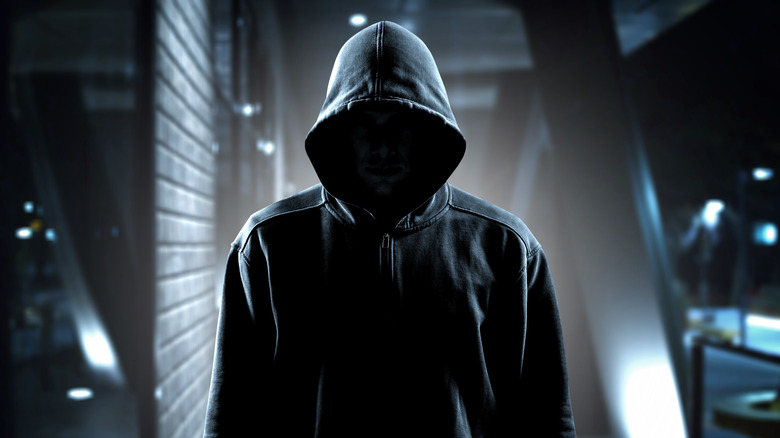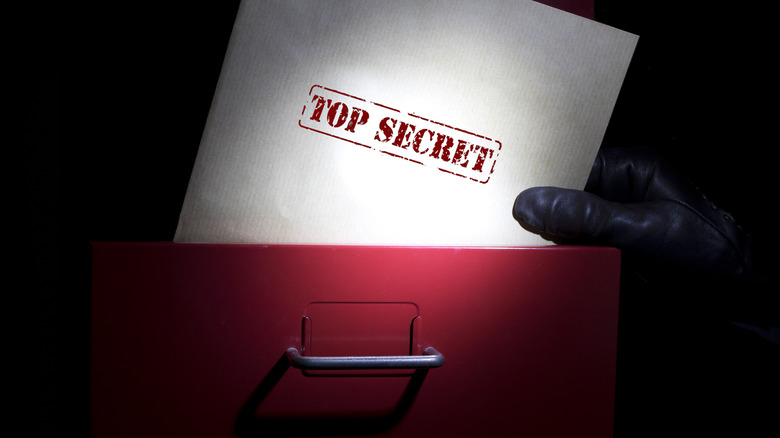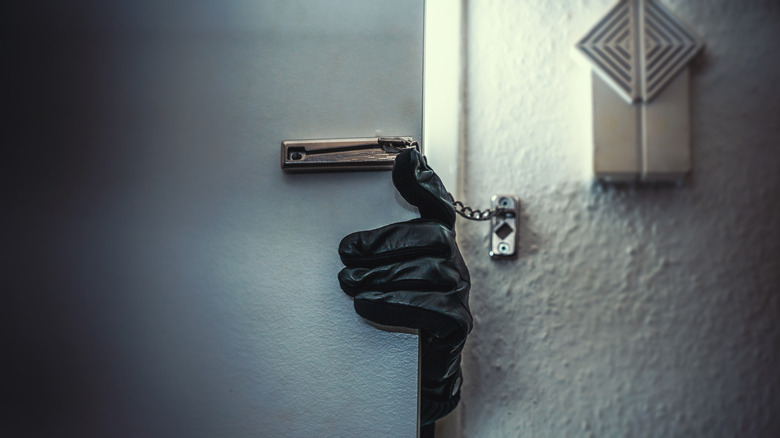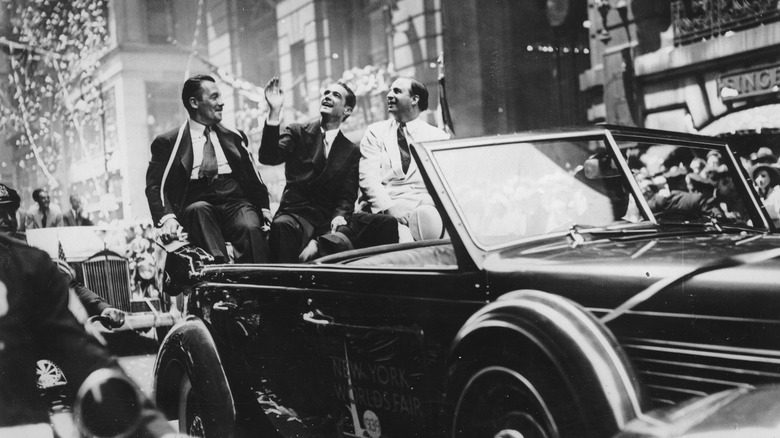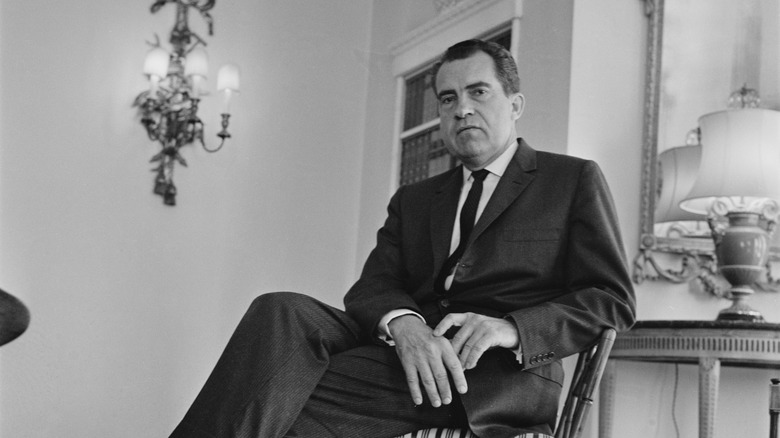Things About Watergate That Still Remain A Mystery
Watergate was a legendary scandal that some say sowed the seeds of skepticism in American politics. What made this landmark case so prevalent was the level of deception proven to have been the actions of the president himself, Richard M. Nixon (via Britannica). Furthermore, those actions and alleged corruption did in fact help him win re-election and the trust of the American people initially. When word got out of his secrecy and lies, the blow to the American spirit ran deep. The damage still exists today.
In the aftermath of the incident, the truth is much clearer. What we now know is a team of criminals, including former CIA officers and FBI agents (via History), broke into the Democratic National Committee offices housed in the Watergate building with the purported goal of helping Nixon win his next election. While much was made clear as the scandal unraveled during President Nixon's second term, many more questions went unanswered, remaining a mystery to this very day.
Was the Watergate break-in conducted under authority of the Huston Plan?
The Huston Plan was a top-secret government information-gathering blueprint, a prelude to the controversial Patriot Act. Kept out of the public eye for half a century, details of the Huston Plan were only recently revealed to the American people (via National Security Archive).
CNN reports that one of the biggest mysteries of Watergate and the '70s era in genera, revolved around the details of this mysterious Huston Plan and whether or not the expansion in surveillance served as the authority upon which the Watergate criminal acts were conducted. Shockingly, portions of this document seem to support this theory. The Nixon-era infiltration proposal most commonly known as the Huston Plan expressly describes phone wiretaps and office break-ins as a legal way to infiltrate Civil Rights activist groups like the Black Panthers.
Ironically, it was the Huston Plan and its predecessor, the Freedom of Information Act, that brought the Watergate scandal to light.
Who commissioned the botched office burglary?
In the beginning, President Nixon vehemently denied any involvement in the Watergate break-ins whatsoever. In a 1973 speech published online by History, he addressed the nation, stating, "I had no prior knowledge of the Watergate break-in. I neither took part in, nor knew about any of the subsequent cover-up activities."
Throughout the national declaration, President Nixon went on to deny both involvement in and authorization of the crime. His campaign shrugged the incidents off as petty theft. The American public so believed his protestations of innocence that he was elected to serve a second term as president of the United States in what Politico described as a "landslide" win.
It wasn't until that second term that his involvement became clear (via Britannica) — a crushing blow, but also a perplexing one. For while he did resign in grave disgrace, he never admitted to commissioning the robbery in the first place, leaving space for some other mastermind to be behind the scenes calling the shots.
What were the burglars really in search of?
You can't exactly break into your opponent's office and ensure a victory in a presidential election, after all. And the lineup of criminals consisted of major political players with high-ranking positions in places like the FBI and CIA (via History). What did any of these political figures stand to gain from undertaking such a risky endeavor? Why risk life, limb, career, reputation, and the possibility of prison in order to listen in on innocent phone conversations?
The obvious assumption is that they were after something specific, a piece of political dirt they knew existed and simply had to uncover and reveal. The Constitution Center reports that rumors of a widescale scandal prevailed then and still do. They consist of wild claims of call girl fiascoes, Democrat-led swindles, and the possibility that the Democrats possessed incriminating evidence that would have tied the disgraced president to controversial billionaire Howard Hughes, possibly costing him the election (via CBS).
What was President Nixon's connection to Howard Hughes?
Terry Lenzner, chief investigator for the Senate Watergate Committee, opened up about the controversial, secretive nature of an alleged (yet unproven) alliance between President Nixon and billionaire aviation expert Howard Hughes in a CBS interview. Candidly, he described these two men, saying, "They're both obsessive. Both paranoid, both thinking everybody's out to get them. And extremely secretive ... and very powerful ..."
As rumor would have it, the two might have been embroiled in a political bribery scheme, with Hughes donating large shares of money in exchange for presidential favoritism. Some have gone as far as to posit that Hughes (above, waving) wanted to "own the president" while Nixon wanted to sever ties. Proponents of this theory believe that there was evidence of this sour relationship stored somewhere within the walls of the Watergate building and it was valuable enough to President Nixon to hire a team of professionals to secure it, embarking on a scandal so large that it would forever alter American politics.
Was President Nixon a fall-guy for larger government corruption?
Perhaps the biggest question of all is the motivation behind President Nixon's 1974 resignation (via CNN). As evidence of the Watergate scandal made national headlines thanks to hard and fast reporting from Washington Post journalists Bob Woodward and Carl Bernstein, distrust of the national government grew (via The Guardian).
With the help of an anonymous government source, code named "Deep Throat" and later revealed to be FBI informant William Mark Felt, the president's involvement in the Watergate scandal was brought to light. With this, other aspects of political corruption, like the existence of the Huston Plan, also drew national attention. If things had continued this way, the American people would have been well within their right to keep probing for more information, perhaps uncovering even more unscrupulous corruption along the way. Nixon's resignation nixed that possibility, leaving behind a wealth of unanswered questions, unreleased footage, and sealed documentation. Coincidences this convenient are almost always met with a level of justified skepticism.
